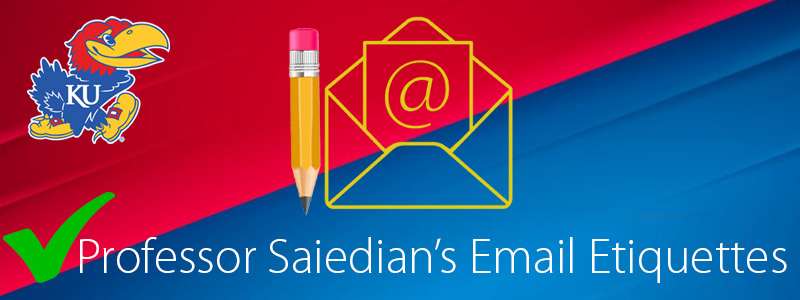Professor Saiedian's recommendation for professional email communication
Effective email communication within a professional setting holds significant importance. Such correspondence necessitates conciseness, clarity, and a tone of respect. It is crucial to bear in mind that you are a representative of the School of Engineering at the University of Kansas, an institution of high regard. Your emails should mirror this elevated stature.
Follow these email etiquette guidelines to maintain a professional tone in your communications. These recommendations are inspired by reputable sources like Indeed and Enterpreneur.
- Include a subject line. Use a clear and concise subject line that reflects the email’s content. For EECS course-related emails, include EECS### and a brief description.
- Include professional greetings. Use appropriate greetings, addressing the recipient by name or title based on formality.
- Use an introduction. Introduce yourself if the recipient doesn’t know you.
- Use professional language. Maintain a professional tone; avoid using slang or informal language.
- Use proper capitalization. Understand the correct use of lowercase and uppercase letters. Capitalize the first letter of sentences, proper nouns, and important headings. Avoid all caps; it may sound like you are screaming your intentions.
- Be concise. Keep emails brief and to the point; avoid unnecessary fluff.
- Proofread. Ensure proper spelling and grammar. Double-check the recipient’s name.
- Use punctuation symbols properly. Use punctuation correctly to enhance clarity and professionalism.
- Use a simple format. Use a simple format and font (preferably sans serif) for uniform display on different platforms.
- Use appropriate closings. End with a professional closing, your name, and contact information.
- Double-check attachments. Double-check attachments. For multiple files, use a descriptive folder name, compress into a zip file, or share on the cloud via a shortened URL.
- Be cautious with reply all. Use ‘reply all’ sparingly to avoid unnecessary content.
- Make responsiveness a priority. Prioritize responsiveness. Choose a response window that balances promptness with manageability. Accept the reality that your response time speaks volumes about your character.
- Acknowledge receipt. Acknowledge receipt of messages promptly.
- If you fall off the wagon, apologize. If delayed, apologize without excuses.

The implications of non-responsiveness
Equally essential is the promptness of your email responses. Failing to acknowledge an email in a timely manner can lead to various interpretations:
- The email might not have reached you.
- The email has gone to your SPAM folder.
- You accidentally deleted the email.
- You intentionally ignored the email. But deliberate disregard of an email might inadvertently establish a precedent wherein the sender might reciprocate the same behavior, a scenario not conducive to effective communication.
The following are verbatim quotes compiled from the Internet about the importance of timely email responses:
- "Responding in a timely manner shows that you are conscientious — organized, dependable and hardworking."
- "No, You Can’t Ignore Email. It’s Rude."
- "Being overwhelmed is no excuse. It’s hard to be good at your job if you’re bad at responding to people."
- “I’m too busy to answer your email” really means “Your email is not a priority for me right now.”

Professor Hossein Saiedian
Electrical Engineering & Computer Science
Eaton Hall 3012
University of Kansas
1520 W 15th St
Lawrence, KS 66045-7621
+1 785 864-8812
saiedian at eecs.ku.edu